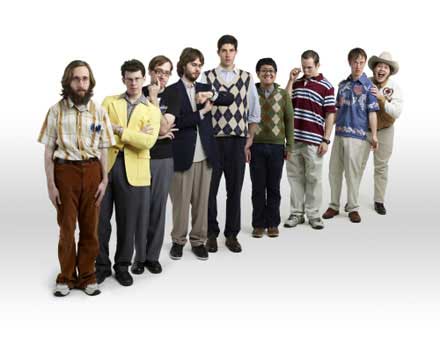 |
|
File photo of a group of "geeks". Move over, high school quarterback. The geek is the new cool kid in town. |
|
Move over, high school quarterback. The geek is the new cool kid in town. According to a new study presented by information technology company Modis in honor of Geek Pride Day, one in six Americans considers himself or herself a geek, and a whopping 57 percent believe being called a geek is a compliment. Americans most closely associate the term "geek" with favorable attributes such as being extremely intelligent (45 percent), a reliable source for technology advice (56 percent) and a first adopter of technology (45 percent), according to a phone survey of 1,000 American adults. However, perhaps one of the most interesting findings that supports this point is that nearly twice as many Americans would prefer to be called a “geek” (41 percent) rather than a "jock" (22 percent). Of the people surveyed by the Opinion Research Group for Modis' study, 17 percent said they were geeks. The results pointed to a cultural shift in the way Americans perceive geeks. While two-thirds of "Millennials," the age 18-34 demographic group, think being identified as a geek is a compliment, only 39 percent of respondents who are 65 and older agree. Eighty-two percent of the respondents feel it is more acceptable to be a geek today than it was 15 years ago. "It might be Americans' increasing dependence on and comfort with technology, or the prevalent images of former 'geeks' who now successfully lead multibillion-dollar technology companies, but being a geek has gone mainstream," said Jack Cullen, president of Modis. At the same time, the survey showed self-identified geeks are not as fond of the label "nerd." Eighty-seven percent of them say they were more comfortable being called a geek than a nerd. Survey respondents feel the professional fields best-suited for geeks are video game designer (65 percent), technology engineer (50 percent) and professional blogger (37 percent). (Read by Nelly Min. Nelly Min is a journalist at the China Daily Website.) (Agencies)
|
让位吧,高中橄榄球队四分卫,现在城里的新派酷哥是“极客”。 据Modis信息科技公司的最新调查,六分之一的美国人认为自己是“极客”,另有多达57%的受访者认为被称为“极客”是一种赞美。该调查旨在纪念“极客节”。 美国人最爱将“极客”和某些优点联系起来,比如45%的受访者认为“极客”非常聪明、能提供正确的技术建议(56%)、是新技术的尝鲜者(45%)。共有一千名美国成年人接受了调查。 但能支持这一论点的一个最有趣的发现是,愿意被称为“极客”的美国人(41%)是愿意被称为“运动健将”的美国人(22%)的两倍。 在Modis公司委派市场研究集团进行的这项调查中,17%的受访者自称“极客”。 调查结果表明,美国人看待“极客”的方式出现了文化转变。三分之二的“千年一代”,也就是年龄在18岁至34岁之间的群体,认为被称为“极客”是一种赞美。而在65岁及以上的受访者中,仅有39%的人对此表示赞同。 82%的受访者认为,与15年前相比,而今“极客”更被大家所接受。 Modis公司总裁杰克•卡伦说:“这也许是因为美国人越来越依赖科技,对科技、以及那些前‘极客’的普遍形象更有好感了。这些人如今成功领导着价值数十亿美元的科技公司。但如今做个‘极客’已经成为主流。” 调查同时表明,自称“极客”的人们却不喜欢被叫做“电脑迷”。 87%的受访者称,自己更喜欢被称为“极客”而不是“电脑迷”。受访者认为最适合“极客”的专业领域是“电脑游戏设计师”(65%)、科技工程师(50%)和专业博主(37%)。 相关阅读 (中国日报网英语点津 Julie 编辑: 冯明惠) |
|
Vocabulary: move over: 挪开,让位 quarterback:(橄榄球)四分卫 geek: 极客,在美国俚语中意指智力超群,善于钻研但不懂与人交往的学者或知识分子,含有贬义,因为极客常常醉心于自己感兴趣的领域,可以牺牲个人卫生,社交技巧或社会地位。 但近年来,随着互联网文化兴起,其贬义的成分正慢慢减少。 但这个词仍保留了拥有超群的智力和努力的本意,又通常被用于形容对计算机和网络技术有狂热兴趣并投入大量时间钻研的人。所以俗称发烧友或怪杰。如电脑怪杰(Computer Geek),技术/科技怪杰(Techno-geek ),玩家怪杰(gamer geek)等。 put something to rest: 平息,使停止 jock: 运动员;爱好体育的男子(或男孩) nerd: 电脑迷,乏味的人 |
